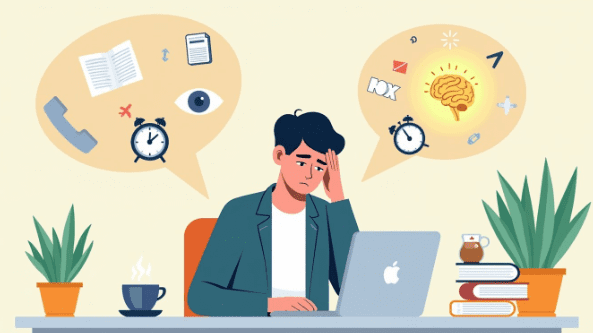Ever find yourself staring at your screen, brain feeling like it’s wading through molasses? You’re not alone. In our fast-paced world, mental fatigue hits hard, zapping productivity and leaving you drained. But what if you could reclaim that sharp focus without relying on endless coffee runs? This article dives into the problem of mental fatigue and explores both natural and scientific solutions to enhance wakefulness and concentration. We’ll cover practical tips, expert-backed insights, and ways to tackle underlying issues like sleep disorders. Let’s get your mind firing on all cylinders.
Understanding Mental Fatigue: The Silent Productivity Killer
Mental fatigue isn’t just feeling tired—it’s a cognitive slowdown that affects decision-making, creativity, and overall performance. Imagine trying to juggle work deadlines while your brain begs for a break. According to the National Institutes of Health (NIH), chronic mental exhaustion can stem from various sources, including poor sleep habits and high stress levels. Learn more about cognitive fatigue from NIH.
One major culprit? Sleep disorders. Conditions like insomnia or sleep apnea disrupt restorative rest, leading to daytime drowsiness and impaired focus. If you’re constantly battling wakefulness issues, it’s no wonder simple tasks feel overwhelming. Semantic terms like “brain fog” or “cognitive haze” often describe this state, where even routine activities demand extra effort.
The impact extends beyond work. Mental fatigue can strain relationships and personal goals, creating a vicious cycle. But here’s the good news: recognizing the problem is the first step toward solutions. By addressing root causes, you can boost your mental stamina naturally and scientifically.
Natural Ways to Combat Mental Fatigue and Enhance Focus
Before turning to advanced options, let’s explore everyday strategies rooted in lifestyle tweaks. These natural methods promote wakefulness without the need for stimulants, focusing on holistic well-being.
Start with nutrition. Fueling your brain with the right foods can make a world of difference. Omega-3-rich options like salmon and walnuts support cognitive function, while antioxidants in berries fight oxidative stress that contributes to fatigue.
Exercise is another powerhouse. A brisk 30-minute walk increases blood flow to the brain, releasing endorphins that sharpen focus. Studies from Harvard Medical School show regular physical activity reduces symptoms of sleep disorders and improves overall mental clarity. Check Harvard’s guide on exercise and brain health.
Mindfulness practices, such as meditation, help too. Just 10 minutes a day can rewire your brain for better concentration. Apps like Headspace offer guided sessions to ease into it.
Here are some quick natural tips to try:
- Hydrate consistently: Dehydration sneaky contributes to brain fog—aim for 8 glasses of water daily.
- Incorporate power naps: A 20-minute snooze can recharge without grogginess, especially if sleep disorders disrupt your nights.
- Optimize your environment: Dim lights and reduce screen time before bed to promote natural wakefulness cycles.
- Herbal aids: Teas with ginseng or ginkgo biloba may enhance alertness, though consult a doctor first.
These approaches build resilience against mental fatigue, creating a foundation for sustained energy.
Scientific Solutions: From Smart Pills to Prescription Options
When natural methods aren’t enough, science offers targeted tools to boost focus and combat persistent tiredness. Enter the realm of cognitive enhancers, often called smart pills, which are designed to promote wakefulness and mental sharpness.
Smart pills like nootropics have gained popularity for their ability to enhance cognitive performance. These supplements, backed by research, can improve memory and attention without the jitters of caffeine. For instance, ingredients like L-theanine combined with caffeine mimic the effects of smart pills by providing calm alertness.
One well-known option is Modafinil, a prescription medication originally developed for sleep disorders like narcolepsy. It promotes wakefulness by influencing brain chemicals, helping users stay alert during demanding tasks. Unlike traditional stimulants, Modafinil offers sustained focus with fewer side effects, making it a go-to for shift workers or those with irregular schedules. However, it’s crucial to use it under medical supervision to avoid dependency.
Research from the Mayo Clinic highlights how Modafinil can address wakefulness issues effectively. Explore Mayo Clinic’s insights on Modafinil. If you’re exploring these options, consulting a healthcare provider is key. For reliable access to such medications, resources like HR Pharmacy USA provide trustworthy online pharmacy services, ensuring you get genuine products with proper guidance. Always prioritize safety and legality when considering smart pills or Modafinil.
Beyond pills, emerging tech like neurofeedback training uses EEG to train your brain waves for better focus. Clinical trials show promise in reducing mental fatigue symptoms.
Tackling Sleep Disorders: A Key to Long-Term Wakefulness
Sleep disorders are often at the heart of mental fatigue, disrupting the body’s natural rhythm and leading to chronic exhaustion. Addressing them head-on can unlock profound improvements in focus and energy.
First, identify common types: Insomnia keeps you tossing at night, while obstructive sleep apnea interrupts breathing, causing fragmented rest. The Centers for Disease Control and Prevention (CDC) reports that one in three adults doesn’t get enough sleep, exacerbating these issues. Read CDC’s sleep guidelines.
To combat this, establish a sleep hygiene routine. Go to bed and wake up at consistent times, even on weekends, to regulate your internal clock.
Consider these steps for better sleep:
- Create a bedtime ritual: Wind down with reading or light stretching to signal rest time.
- Limit blue light: Use apps or glasses to block screen emissions that hinder melatonin production.
- Track your sleep: Wearables like Fitbit monitor patterns, helping spot disorders early.
- Seek professional help: If symptoms persist, a sleep study can diagnose issues like apnea.
By prioritizing sleep, you’ll enhance natural wakefulness, reducing reliance on external aids like smart pills.
Expert Insights: What the Pros Say About Boosting Focus
Experts agree that a multi-faceted approach yields the best results. Dr. Matthew Walker, a neuroscientist and author of “Why We Sleep,” emphasizes that fixing sleep disorders is foundational. “Without quality rest, no amount of smart pills or caffeine can sustain true cognitive performance,” he notes in his TED Talk.
Psychologist Dr. Kelly McGonigal from Stanford University advocates for stress-reduction techniques. Her research shows mindfulness can rewire neural pathways, combating mental fatigue effectively. Stanford’s resources on mindfulness.
Nutritionists like those at the Academy of Nutrition and Dietetics recommend balanced diets to support brain health. Foods high in B vitamins, such as leafy greens, aid in energy production and focus.
Integrating these insights: Combine natural habits with scientific tools. For example, pair Modafinil (under doctor advice) with exercise for amplified wakefulness. Remember, individual responses vary—track what works for you.
Lifestyle Integration: Building Habits for Sustained Energy
To make these solutions stick, weave them into your daily routine. Start small: Swap one sugary snack for a nutrient-dense alternative to avoid energy crashes.
Build a focus-friendly workspace. Ergonomic setups reduce physical strain, indirectly boosting mental stamina. Semantic concepts like “flow state” come into play here—design your day to enter deep concentration zones.
For those with sleep disorders, cognitive behavioral therapy for insomnia (CBT-I) is gold-standard. Apps like CBT-i Coach guide you through it, promoting better wakefulness.
Don’t overlook social connections. Engaging conversations stimulate the brain, warding off isolation-induced fatigue.
If exploring smart pills, educate yourself on options like Modafinil through reputable sources. Always consult professionals to tailor approaches to your needs.
The Role of Supplements and Nootropics in Modern Focus Strategies
Supplements bridge the gap between natural and scientific methods. Nootropics, often dubbed smart pills, include compounds like bacopa monnieri, which studies suggest improve memory over time.
Caffeine with L-theanine is a simple stack for enhanced alertness without jitters. For more potent options, Modafinil stands out for its wakefulness-promoting effects, especially in managing sleep disorders.
A 2022 review in the Journal of Clinical Sleep Medicine found Modafinil effective for shift-work sleep disorder, highlighting its role in real-world scenarios. Access the journal’s abstract.
When sourcing supplements, reliability matters. Online pharmacies like HR Pharmacy USA offer access to verified products, making it easier to incorporate these into your routine safely.
Potential Pitfalls and How to Avoid Them
While boosting focus is empowering, watch for over-reliance on any method. Smart pills like Modafinil can lead to tolerance if misused, so cycle usage and monitor effects.
Natural approaches aren’t foolproof either—extreme dieting might worsen fatigue. Balance is key.
If sleep disorders persist despite efforts, seek medical evaluation. Conditions like thyroid issues could mimic fatigue symptoms.
Stay informed via authority sites like WebMD for balanced views.
Conclusion: Reclaim Your Focus and Thrive
Mental fatigue doesn’t have to define your days. By understanding its roots—like sleep disorders—and implementing natural strategies such as better nutrition and exercise, you can build a strong foundation. For tougher cases, scientific options like smart pills and Modafinil offer targeted support for wakefulness, always with professional oversight.
Remember, small changes compound into big wins. Start today: Prioritize sleep, experiment with tips, and consult resources for personalized advice. You’ve got the tools to banish brain fog and embrace peak productivity. Here’s to sharper, more energized days ahead!
FAQs
- What are smart pills, and do they really work?
Smart pills, or nootropics, are supplements or medications designed to enhance cognitive function and wakefulness. Research from sources like NIH shows they can improve focus for some, but results vary. Always consult a doctor before use. - How does Modafinil help with sleep disorders?
Modafinil promotes wakefulness by stimulating brain activity, making it effective for disorders like narcolepsy. Per Mayo Clinic, it’s prescribed to reduce excessive daytime sleepiness, but it’s not a cure—all. - Can natural methods alone fix mental fatigue caused by sleep disorders?
Natural methods like improved sleep hygiene and exercise can help manage symptoms, but severe sleep disorders may require medical intervention. The CDC recommends combining lifestyle changes with professional advice for best results.
For More Visits: Mymagazine



































